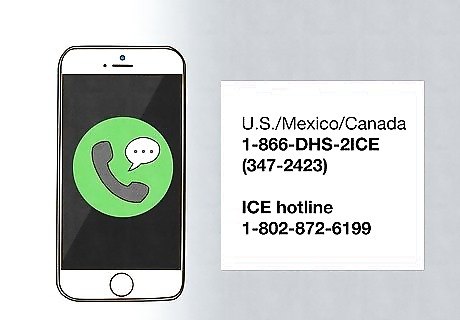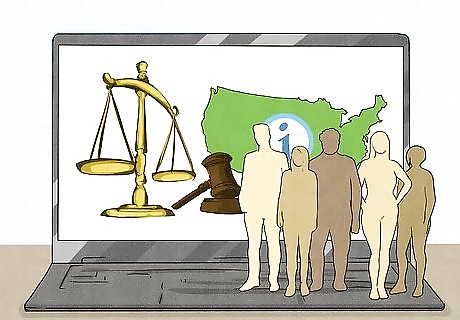
views
X
Research source
In the United States and other countries, illegal immigration rapidly outpaces legal immigration.[2]
X
Research source
Some economists posit that illegal immigration decreases wages for legal citizens, while other studies find that illegal immigrants create a "tax burden" on an economy by consuming a greater monetary value of government services than they contribute in tax revenue.[3]
X
Research source
[4]
X
Research source
In any case, illegal immigration is against the law. For instructions on how to identify and report illegal immigrants, read on.
Identifying Illegal Immigrants

Never make snap judgments based on appearance. In many countries, certain ethnic groups are stereotyped as being comprised mostly of illegal immigrants. While illegal immigrant populations do often have observable demographic trends, it's bigoted to assume people are illegal immigrants based simply on their race, culture, or appearance. Before you report someone as an illegal immigrant, you need real proof. If you don't have it, you're potentially wasting the resources of your country's law enforcement agencies or, even worse, making life miserable for an innocent person and his or her family. Below are things you should not take into account when considering whether to report someone: The person's race. Ask yourself: "Would I honestly report someone who looks like me, or only someone who looks different?" If you would not, you're doing this for racist reasons. The person's ability to speak your country's official language. Legal immigrants sometimes struggle with a new language for years. The person's job (or lack thereof). A manual labor job doesn't mean a foreign-born person is an illegal. A high-level job doesn't mean someone isn't!

Look for definitive proof. Accusations that someone's an illegal immigrant that aren't supported by some sort of evidence are baseless. For a much better chance of being taken seriously by law enforcement agencies (and, more importantly, a better chance that you're correct in your accusation), gather evidence. Remember, when trying to find proof that someone's an illegal immigrant, don't do anything illegal yourself - vigilante justice is illegal almost everywhere. Don't tap someone's phone or snoop through their mail. Instead, try to get evidence like the following: Evidence that this person is being paid "under the table." If you see your boss paying someone in cash at the end of the work day, you're right to be suspicious. Lack of official documentation. If you're an employer and one of your employees is unable to provide a valid social security number or other necessary documents, you may be dealing with an illegal immigrant. Remember that it's a crime to hire illegal immigrants. A background check raises suspicion. If the results of a normal, legal background check show that someone is not a legal citizen, you're justified in contacting the authorities. Consider hiring a certified private investigator or, if you live in the United States, running a free "E-verify" check via the Department of Homeland Security's website. Jokes or brags by a person about his or her illegal status. If, without spying or eavesdropping, you hear someone admit to being an illegal immigrant, take it seriously.

Use available public records. Government information that's freely available to the public can help inform your choice to report someone as an illegal immigrant. Particularly useful are court summons, which are available on the public record. Local immigration courts will have information about summons for immigration-related offenses. If someone has failed to appear at an immigration court summons, they may be an illegal immigrant. Provide as much information on this person as possible to the court, including this person's full name, place of employment, and current residence. Keep in mind that illegal immigrants may use aliases and false information about their whereabouts.
Reporting Illegal Immigrants to the Proper Authorities

Report criminal illegal immigrants directly to the local police. Most illegal immigrants are hardworking and moral, if technically law-breaking. Some, however, take advantage of their "off the grid" status to engage in serious crime. Still others are taken advantage of, forced into drug trafficking or prostitution. If you see any evidence of crime, call the police immediately. When reporting the crime, you may state that you believe this person is also in the country illegally and mention any evidence you have to that effect. If you come across evidence of serious crime, don't delay reporting it in hopes of gathering more evidence of illegal immigration. It's more important to immediately stop crimes that hurt people and damage communities than to waste time in hopes of getting more illegal immigrants deported.

Contact Immigration and Customs Enforcement (ICE). In the United States, ICE is responsible for detaining illegal immigrants. Report names and locations of illegal aliens to this agency. Via the agency's website, you can find information for contacting the central agency as well as local field offices in your area. ICE also operates a confidential tip hotline for the U.S., Mexico, and Canada. It is available toll-free at 1-866-DHS-2ICE (347-2423). For people in other countries, the ICE hotline number is 1-802-872-6199.

Contact the Border Patrol. In the U.S., Customs and Border Protection is an agency in charge of securing the nation's borders. On the CPB website, you can find information for contacting one of the CPB's many regional Sector Offices as an alternative reporting method. Like ICE, CPB operates an anonymous tip line. The number for this hotline is 1-800-BE-ALERT (232-25378.)
Making an Informed Decision

Understand why illegal immigration is a problem. Reporting an illegal immigrant doesn't mean you can't sympathize with the plight of illegal immigrants worldwide. Most illegal immigrants are simply looking for greener pastures because the opportunities in their own country are grim. Others are fleeing war or persecution. In a perfect world, there simply wouldn't be any reason for people to uproot their families and enter another country illegally. Unfortunately, illegal immigration can disadvantage the host country's citizens. It also disregards the laws and needs of the host country. To uphold the legitimacy of the law, countries have to make efforts to stop illegal immigration while promoting legal alternatives.

Recommend legal alternatives to living in the country illegally. If you've got a guilty conscience about reporting an illegal immigrant to the authorities, know that, depending on the country and the circumstances, there are some legal workarounds for illegal immigrants. In the United States, illegal immigrants have three legal means of recourse: Deferred Action for Childhood Arrivals (DACA), Hardship Waivers, and special allowances for victims of qualifying crimes. Each method allows an illegal immigrant to legally attempt to avoid or delay prosecution or even gain a visa. DACA is for undocumented immigrants who came to the United States as children. It allows an illegal immigrant to apply for employment authorization and halts any ongoing deportation proceedings. However, it can be revoked at any time. The immigrant must meet certain criteria: he or she must be under 31, must have came to the US before he or she was 16, must have been educated in the country, and must have lived in the country continuously since June 2007 if an immigrant meets these (and several other) qualifications, he or she may be eligible for deferment under DACA. Hardship waivers are granted to spouses or children of lawful US citizens in situations where deportation would cause "extreme hardship." The exact definition of "extreme hardship" is somewhat nebulous - examples are if the immigrant would be targeted for violence in his or her home country or if his or her deportation would result in financial ruin for the lawful citizen. Victims of certain types of crimes are allowed special visas, especially if they assist law enforcement in the investigation of the crime. Victims of crimes like human trafficking, abduction, exploitation, and forced prostitution (as well as other crimes) are eligible for U or T nonimmigrant visas.

Participate in the political debate. Immigration law is a controversial, hot-button topic in the United States and many other countries. A variety of proposed reforms and fixes exist - some seek to tighten border security, while others seek to make the path to legal citizenship easier. To contribute to long-term, wide-reaching changes in illegal immigration, get involved in your nation's immigration debate. Participate in marches and protests. Contact the politicians who represent you. Volunteer to work (or raise money for) political campaigns that support your stance on immigration reform. Most countries welcome immigrants that enter the country legally. Many countries, however, have quotas that take into consideration the number of immigrants, their country of origin, and the timing of their entrance so as not to tax the resources of the host country. One proposed reform in the United States is to greatly increase these quotas to reduce the amount of time potential immigrants have to wait for legal resident status (which can take years). Illegal immigrants can (and do) also contribute to a country through their work and consumption, as well as by paying some taxes. Another proposed fix would be to allow illegal immigrants to make these contributions (and more) legally by lightening the restrictions on work visas, "green cards," etc. Other reforms focus on making it harder for illegal immigrants to work in their host countries. These reforms include tighter border security as well as harsher punishments for illegal immigrants and their employers.

Be sure to vote. Long-term, wide-reaching solutions to illegal immigration will most likely not be through the efforts of individuals. Rather, they will be through sound, fair, well-enforced laws enacted by representatives elected by millions of citizens. Support efforts to fix immigration law by voting. Study local and national politicians' stances on immigration issues. Vote for the ones whose views match yours. If none do, make your voice heard - start a grassroots campaign or run for office yourself!

















Comments
0 comment